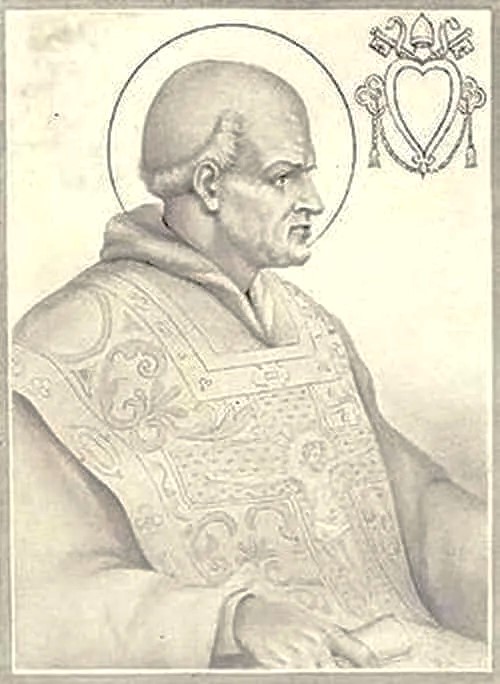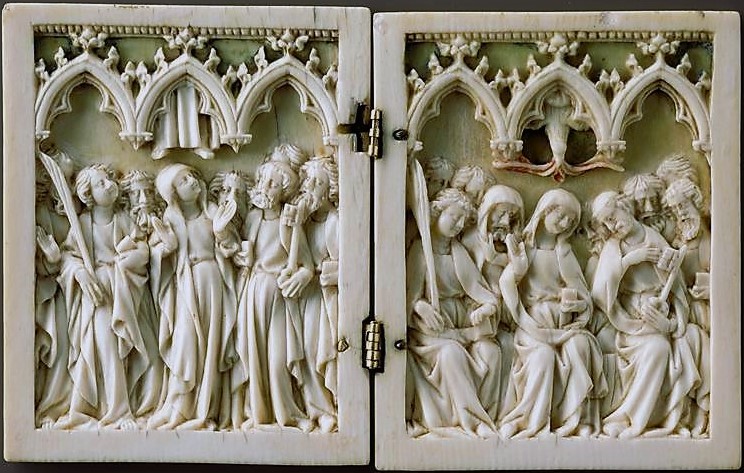A Reading from the Holy Gospel According to John.
Jesus said to his disciples: “A little while and you will no longer see me, and again a little while later and you will see me.” So some of his disciples said to one another, “What does this mean that he is saying to us, ‘A little while and you will not see me, and again a little while and you will see me,’ and ‘Because I am going to the Father’?” So they said, “What is this ‘little while’ of which he speaks? We do not know what he means.” Jesus knew that they wanted to ask him, so he said to them, “Are you discussing with one another what I said, ‘A little while and you will not see me, and again a little while and you will see me’? Amen, amen, I say to you, you will weep and mourn, while the world rejoices; you will grieve, but your grief will become joy.”
The Gospel of the Lord.
Transcription of Sermon
In many countries of the world today, and according to Tradition, today would be the Ascension of Our Lord, which was 40 days after His Resurrection. And it was moved to Sunday, much like Corpus Christi. So far Ash Wednesday is safe. It seems to be safe on Wednesday. Let’s hope it doesn’t get moved to a Sunday.
Nonetheless, we’ve got the Feast of Pope John I. John I was a very well-respected, well-regarded deacon in the Church in Rome. His name is actually mentioned before he was made Pope. His name is somewhat famous, I guess you could say, in that Boethius, who was the greatest Latin writer of the early medieval period, that would be end of the fifth century, dedicated half of his works to this gentleman named Deacon John. And this Deacon John would then become Pope John I, and he became Pope John I in a very difficult situation. See, whenever we look at the lives of the saints, we’re always seeing their context when we have this refrain, it was a very difficult time for the Church. Well, that seems to be every age, and this one was no different.

Pope John I, c. Late Fifth Century–526
This was at a time when the ruler of Italy was an Ostrogoth and an Aryan, and the Aryans followed the heresy that taught that Christ was below the Father, that Christ was not equal to God. In our modern days, Jehovah’s Witnesses would say that. Unitarians would say that. They would probably eschew the name Aryan, but nonetheless, that is what they believe. And Theodoric, who was the Ostrogoths’ ruler of Italy at that time, he had his seat in Ravenna, was very nervous about the popularity of this Pope John because most of the people on the Italic Peninsula were Catholic, fewer heretics, and there was this Pope John who was very much revered, who had his own moral authority that he exercised amongst the people in spite of his advanced age and his infirmity. He was not a well man when he was made Pope. And Theodoric thought well, ‘I have nothing to lose. I am going to invite the Pope to go to Constantinople on an embassy on my behalf,’ because in Byzantium the Arian heresy was not just something that was discussed in theological circles, but it was also a time where the heretics themselves were persecuted by the State in Constantinople. And so, they pleaded to Theodoric to intervene for their wellbeing and he said, ‘Okay, I have an idea,’ and he sent Pope John I as an ambassador of peace to try and get the Catholics to stop persecuting the Aryans there.
And so, he met with Justin, the Emperor there in Constantinople, and was so well received, and also listened to, that the persecution of the heretics came to an end. And word got the Theodoric that John was something of a superstar over in Byzantium and now this made him all the more nervous about his own position. And so, what did he do? Upon getting news that Pope John was back, summon him to Ravenna and then arrested him, had him beaten and, in his old age, he died of his wounds. So, what do we learn from this?
That the Church is of Heaven first, and nonetheless, is rooted in this world. But in order to transform the world, a world that has fallen, and the Church is the bride of Christ first and foremost, not a human organization, not something founded by men. In fact, when you hear people talk about sins of the Church, that’s really an injustice. The Church is immaculate. Sons and daughters of the Church can sin for sure, and we all have experience of that, but the Church herself is immaculate, the members… not so much.
We also learn that this perennial Catholic teaching of how to deal with heretics, we should try and convince them through argument, through prayer and through fasting, through a penance, but not through physical persecution. We ought to present the truth and the truth itself is attractive. That’s something that the Church has always taught. And so, what John did in Constantinople was actually in keeping with what would become Church Social Teaching.
Interestingly, after John’s martyrdom Pope Felix IV was sought out by Theodoric the Aryan. He said, ‘Okay, you have a new Pope, and he’s my man.’ And Felix IV, who was the successor to Pope John I, was very shrewd man. And so, he took the position as Pope, in spite of the dubious circumstances of his appointment, and used it for the benefit of the Church. And so, because Theodoric thought, ‘He’s my man.’ He took his counsel, and Felix IV was able to increase the standing of the Church in society because of his position. And in the first year of Felix IV’s papacy, Theodoric died. And so, we had this strengthened papacy, the strengthen Church in spite of the Ostrogoths Aryan emperor who had just died.
And so, we see God’s providence allows all sorts of horrible things, all sorts of bad things, all sorts of good things. And nonetheless, His plan is manifest, and sometimes this is only visible in hindsight. And so, our task is to ask for the increase of theological virtue to see His hand at work now, not merely in hindsight, but see His hand, his hand at work in my life now, in my life, in my situation in the world, in the Church, and all sorts of dysfunctional, difficult situations. His providence is manifest for those who have the eyes of Faith to see.
In the Name of the Father, and of the Son, the Holy Ghost, Amen.

